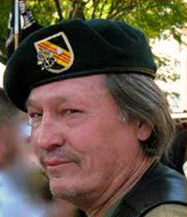Ted Sampley | |
|---|---|
 Sampley wearing his green beret | |
| Birth name | Theodore Lane Sampley |
| Born | July 17, 1946 Wilmington, North Carolina, U.S. |
| Died | May 12, 2009 (aged 62) Durham, North Carolina, U.S. |
| Buried | Dyson Cemetery, Ivanhoe, North Carolina |
| Allegiance | United States |
| Branch | Army |
| Years of service | 1963–1973 |
| Rank | Staff sergeant |
| Unit | 173rd Airborne Brigade, 3d Special Operations Squadron, 6th Special Operations Squadron |
| Awards | 4 Bronze Stars, Army Commendation Medal, Vietnamese Cross of Gallantry |
| Spouse(s) | Kiku Uehara Sampley, Robin Owen Sampley |
| Children | 2 |
| Other work | Pottery, POW/MIA activism |
Theodore Lane Sampley (July 17, 1946 – May 12, 2009[1]) was an American Vietnam War veteran and activist. He primarily advocated for those servicemen still considered missing in action or prisoners of war (POW-MIA) as of the end of hostilities in 1975. A staunch political conservative, he also ran for local political office several times. He is credited with the research that identified Air Force Lt. Michael Blassie as the Vietnam fatality buried at the Tomb of the Unknown Soldier, and for his role in organizing the annual Rolling Thunder motorcycle event in Washington. In Kinston, North Carolina, where he lived for much of his adult life, he was known for his local civic activism, most notably his effort to build a replica of the Confederate ironclad CSS Neuse, the only full-size replica of a Confederate ironclad, in the city's downtown.
A native of Wilmington, North Carolina, he enlisted in the Army in 1963. Two years later, he was deployed to Vietnam with the 173rd Airborne Brigade, where he did a year's tour of duty as a combat infantryman. Afterwards he became a Green Beret and served another tour leading and training a Civilian Irregular Defense Group along the Cambodian border, earning four Bronze Stars, an Army Commendation Medal and the Vietnamese Cross of Gallantry. After returning to Fort Bragg to train other Special Forces soldiers for duty in Vietnam, he left the Army in 1973 with the rank of staff sergeant.[2]
Following his honorable discharge, Sampley worked in journalism and then settled in Kinston, North Carolina, where he opened a craft store selling ceramics, an art he had learned from local artisans in his off-duty time while stationed on Okinawa at the beginning of his military career. In the early 1980s he began his activism, after learning that not all the POWs and MIAs in Vietnam at the end of the war had been accounted for, joining groups demanding that the U.S. put pressure on the Vietnamese government. He started and published U.S. Veterans Dispatch, a newspaper primarily devoted to the issue.
Sampley soon became known as an outspoken activist for his cause, using confrontational tactics similar to those used by antiwar protestors. He was particularly hostile to Senators John Kerry and John McCain, both of whom had served in Vietnam and were members of the 1993 Senate select committee which found that no POWs or MIAs remained alive in Southeast Asia. McCain himself, whom Sampley frequently accused of having been brainwashed by the Vietnamese during his years as a POW in the Hanoi Hilton, said Sampley was "one of the most despicable people I have ever had the misfortune to encounter";[3] Sampley was convicted of assault after a fight with McCain's chief of staff. He was criticized further for using the POW-MIA cause for his aggrandizement and personal enrichment; sculptor Frederick Hart successfully sued Sampley for unpaid royalties over his unauthorized use of Hart's The Three Soldiers on T-shirts he sold near the Vietnam Veterans Memorial on the National Mall.
- ^ Schudel, Matt (May 15, 2009). "Ted Sampley, 62: Vietnam Veteran Was an Outspoken Advocate for POWs". The Washington Post. Retrieved April 26, 2019.
- ^ "Theodore Lane "Ted" Sampley". Kinston Free Press. Kinston, North Carolina. May 15, 2009. Retrieved April 26, 2019.
- ^ Janofsky, Michael (February 14, 2004). "The 2004 Campaign; McCain Fights Old Foe Who Now Fights Kerry". The New York Times. Retrieved May 1, 2019.